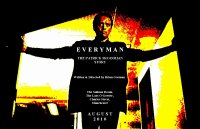The Unmutual Reviews: "Everyman"
Review by Brian Watson.

What could be a more apt setting for a night designed to reveal the apparently contradictory motivations of that most complex of men, Patrick McGoohan, than The Lass O'Gowrie, a Manchester pub that celebrates with a plaque Violet Carson (Coronation Street's Ena Sharples), still boasts Manchester's oldest pissotière (last used in 1896 and retained for posterity - they still keep the brass nicely polished), and which has regular sessions of retro-gaming on Sinclair Spectrum computers?
With complementary comics available for the patrons and fliers promoting "the only Dr Who convention to be held in an engine shed", The Lass has a good grasp on the eclectic strands that inform modern culture. Why, it's even just across the road from The Factory, for many years the focus of Manchester, and Britain’s, music scene.
On Friday 13th August 2010, in an upstairs room of The Lass, Brian Gorman performed the first public dramatised reading of his play EVERYMAN. Portraying both McGoohan and his iconic creation Number Six from The Prisoner, and supported by two voices that were mostly offstage, Brian achieved what no Number Two managed, that was to deconstruct the personality of the man and propose a very credible "what it's all about" of McGoohan's life and work.
From his birth in New York, via his early stage work learning his craft, meetings with famous men of the stature of Orson Welles, Sir Lew Grade, and most of the cream of British acting talent in the 1950s and 1960s, as well as the definitive playing of the title role in Henrik Ibsen's Brand, we are shown the influences that found total expression in The Prisoner, a work of genius that anticipated by 40 years, through the medium of a TV drama series, the state’s – EVERY state’s - relentlessly increasing grip on society and the steady erosion of one's rights to be simply oneself, an individual.
The script of EVERYMAN is a joy: at turns witty, informative, dramatic, and wonderfully paced throughout. The author knows his subject thoroughly, tells the tale well and, while he refers to influences that surface later in The Prisoner, he never descends to quote-dropping for gratuitous effect.
The second and third voices in the production added textual references from the Everyman morality play and appropriate poetry extracts and other quotes, and one “voice” actually comes onstage to personify a Number Two character at a potentially-powerful point in the narrative. This section needed more impact, that’s always hard to achieve when both players are holding scripts, and it could have been used better if it was longer.
In fact throughout, I felt that the two offstage voices could easily be condensed into one role and he, or she, should be given more to do. From a practical point of view, it gives the central player a present foil to play off as well as some respite, and a dialogue often reveals more than a monologue through direct questioning and response. If that second player could actually portray in the audience’s sight Sir Lew Grade and Orson Welles (both big men, both in stature and personality) for their pivotal scenes in McGoohan’s career, so much the better.
EVERYMAN is said by the author to be a work in progress and I would welcome the addition of a second half that covers McGoohan’s career post-Prisoner. He showed through his later work that he was anything but a "one trick pony", winning two Emmys for his work on Columbo with his friend Peter Falk and playing a stunning King Edward Longshanks in Braveheart, as well as bringing his versatile talents to many productions for TV and film including Scanners, Escape From Alcatraz and Hysteria. He had even started a new stage in his career in 2002, voicing a character in Treasure Planet.
He could have had more starring roles; he was the first choice for the roles of Gandalf in the Lord of the Rings trilogy and for Dumbledore in the Harry Potter films but turned both of them down. One can speculate that he held strong moral feelings against magic being portrayed as entertainment, but that must stay just guesswork now.
I enjoyed EVERYMAN very much, and I would like to see a more spiky actor in the lead role. I know another actor was originally booked to have played the part in this production, and Brian Gorman is a very good actor with a great deal of stage presence with as near to a complete understanding of the essence of Patrick McGoohan as anyone outside the family, but perhaps he likes McGoohan too much to actually portray the man's ruthlessness and his relentless pursuit of excellence in his craft?
It is significant that people who worked with McGoohan say how focussed he was at work, how hard to get to know, and he certainly responded promptly when an on-set conversation was repeated online a few years before his death. He was principled, moral, and private; a loyal family man with a professional approach to his work.
EVERYMAN is a remarkably good play that deserves a wider audience than those already persuaded of Patrick McGoohan's genius.
© 2010 Brian Watson
and The Unmutual Website